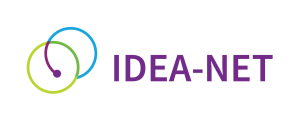Inspiration and considerations for a more inclusive environment in and around the classroom
From the many different frameworks and literature available, four broad approaches to inclusive pedagogy can be discerned (see figure 8-11):
- Generic approaches: Guided by the principles of fairness and equality (rather than equity), generic approaches apply the same pedagogical approach to all students. It assumes a single standard fits everyone, which often marginalizes students who deviate from the dominant norm. As a result, it tends to individualize underachievement, overlooking systemic barriers and excluding those whose learning needs and identities differ.
- Support approaches: Support approaches provide targeted assistance to students who are seen as not fitting the norm. These are often implemented as extracurricular or supplemental programs (e.g. mentoring, tutoring, or bridging initiatives) that aim to help students cope and succeed within the existing structure rather than transforming that structure.
Examples of such approaches/frameworks:
- Critical Pedagogy (bell hooks, Paulo Freire, etc.): Encourages students to question power structures, engage in dialogue, and see education as a tool for liberation.
- Social Justice Education (Lee Anne Bell, Maurianne Adams, etc.): Focuses on developing critical awareness and action to address inequality, both in and outside the classroom.
- Anti-Racist Pedagogy (Ibram X. Kendi, Bettina Love, etc.): Confronts racism directly by embedding anti-racist principles in curriculum, teaching, and institutional policy.
- Decoloniality in Education (Sabelo Ndlovu-Gatsheni, Walter Mignolo, Catherine Walsh, etc.): Aims to deconstruct Eurocentric knowledge systems and legitimize Indigenous and marginalized epistemologies.
These approaches are not mutually exclusive, nor is one ‘better’ than the other: in practice, they often overlap each other based on what is both possible, fitting and desirable in a given context.
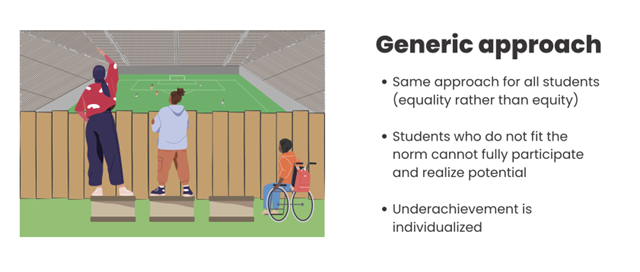
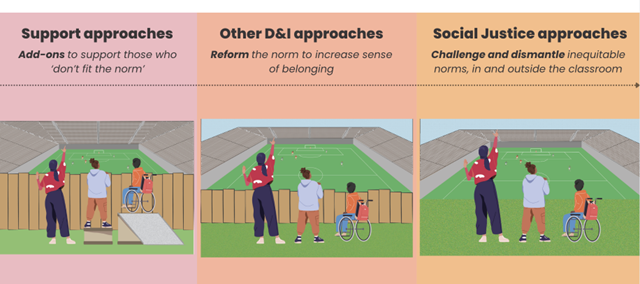
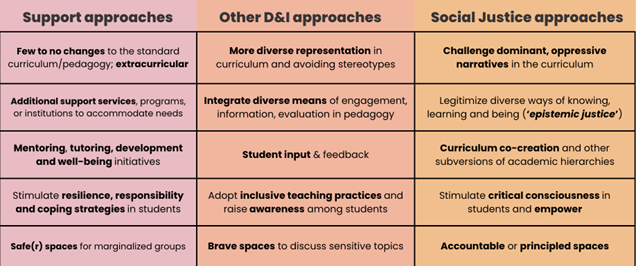
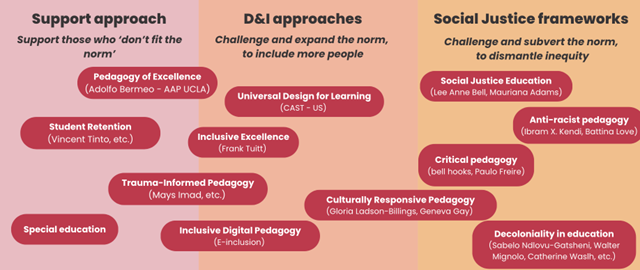
- Become familiarized with different approaches to inclusive pedagogy.
- Reflect on inclusive teaching practices and how you as an educator can apply these in your own practice.
The activity below is to be led by a facilitator, in groups in workshop settings, to reflect on various inclusive teaching strategies and how inclusive their own teaching practices are. The facilitator can adapt the activity to fit the needs of the group and situation.
- In advance, prepare for the session by printing and cutting the teaching practice cards (under ‘Presentation slides’). Fold the cards closed and put them in a hat or box.
- Introduce the different approaches to inclusive teaching practices using the information, slides and other resources of this module.
- Afterwards, introduce the activity. Have each participant draw one of the folded inclusive teaching practice cards from the hat/box. Then, ask them to form groups of 2-3 people.
- Let the groups freely discuss the practices on their cards with each other. Some discussion questions are already on the cards, but here are some more general discussion questions to show on the slide:
- How could you adapt these strategies to your classes? Or how do you already?
- What challenges might arise? How could you address them?
- Are any of these strategies especially relevant in your national, institutional or disciplinary context?
- After 15-20 minutes, ask the groups to share some of their reflections with the whole group.
Freire, P. (1970). Pedagogy of the Oppressed. New York: Continuum.
Hooks, b. (1994). Teaching to Transgress: Education as the Practice of Freedom. Routledge.
Adams, M., Bell, L. A., & Griffin, P. (Eds.). (2007). Teaching for Diversity and Social Justice (2nd ed.). Routledge.
Bell, L. A. (2016). Theoretical foundations for social justice education. In M. Adams et al. (Eds.), Teaching for Diversity and Social Justice (3rd ed.). Routledge.
Learning for Justice. (2023). Critical Practices for Social Justice Education Toolkit. https://www.learningforjustice.org/sites/default/files/2023-07/LFJ-Critical-Practices-for-Social-Justice-Education-July-2023-07272023.pdf
Kendi, I. X. (2019). How to Be an Antiracist. One World.
Love, B. L. (2019). We Want to Do More Than Survive: Abolitionist Teaching and the Pursuit of Educational Freedom. Beacon Press.
Mignolo, W. D., & Walsh, C. E. (2018). On Decoloniality: Concepts, Analytics, Praxis. Duke University Press.
Ndlovu-Gatsheni, S. J., & Schramm, K. (2024). Knowing–Unknowing: African Studies at the Crossroads. Brill.
Baboeram, P. (n.d.). The Uprising: A Guide for Educators to Engage Students in Decolonizing the Mind. https://www.pravinimusic.com/wp-content/uploads/The-Uprising-Educational-Toolkit.pdf
CAST. (2018). Universal Design for Learning Guidelines version 2.2. https://udlguidelines.cast.org/
Tuitt, F., Haynes, C., & Stewart, S. (2023). Race, Equity, and the Learning Environment: The Global Relevance of Critical and Inclusive Pedagogies in Higher Education (2nd ed.). Stylus Publishing.
E-Inclusion. (2023). Handbook for Inclusive Digital Education. https://einclusion.net/project-outputs/handbook-for-inclusive-digital-education/
Bermeo, A. (2016). Developing a Pedagogy of Excellence. [Presentation] https://slideplayer.com/slide/7335897/
Teaching Learning Center (n.d.). Pedagogy of Excellence. https://www.tlcenter.nl/begrippenlijst/pedagogy-of-excellence/
University of Michigan. Trauma-Informed Pedagogy – Equitable Teaching Initiative. https://sites.lsa.umich.edu/equitable-teaching/trauma-informed-pedagogy/
Bitanihirwe, B., & Imad, M. (2023). Gauging trauma-informed pedagogy in higher education: A UK case study. Frontiers in Education, 8, Article 1256996. https://doi.org/10.3389/feduc.2023.1256996
Tinto, V. (2012). Leaving college: Rethinking the causes and cures of student attrition. University of Chicago press.
Tinto, V. (2012). Completing college: Rethinking institutional action. University of Chicago Press.
Knowledge Platform – Inclusive Education. Developed by Erasmus University Rotterdam, IDEA Center. https://www.eur.nl/en/about-university/vision/idea-
Inclusive Teaching Resources. Developed by Brown University, Sheridan Center for Teaching and Learning. https://sheridan.brown.edu/resources/inclusive-teaching
Inclusive Education Framework. Developed by University of Hull and partners. https://www.inclusiveeducationframework.info
Inclusive Curriculum Design Toolkit. Developed by Higher Education Academy (Advance HE, UK). https://www.advance-he.ac.uk/knowledge-hub/inclusive-curriculum-design-higher-education
Guideline Toolkit: How to set up an Inclusion, Diversity, Equity and Access (IDEA) Office. Developed by IDEA-NET project. https://idea-net.eu/guideline-toolkit/
Denktaș, S., de Bruin, G., & van den Ring-Bax, J. Turning DEI Goals into Reality: A Hands-On Guide to an Inclusive Workplace. [Book developed by Erasmus University Rotterdam IDEA-center] https://www.eur.nl/en/news/book-turning-dei-goals-reality
